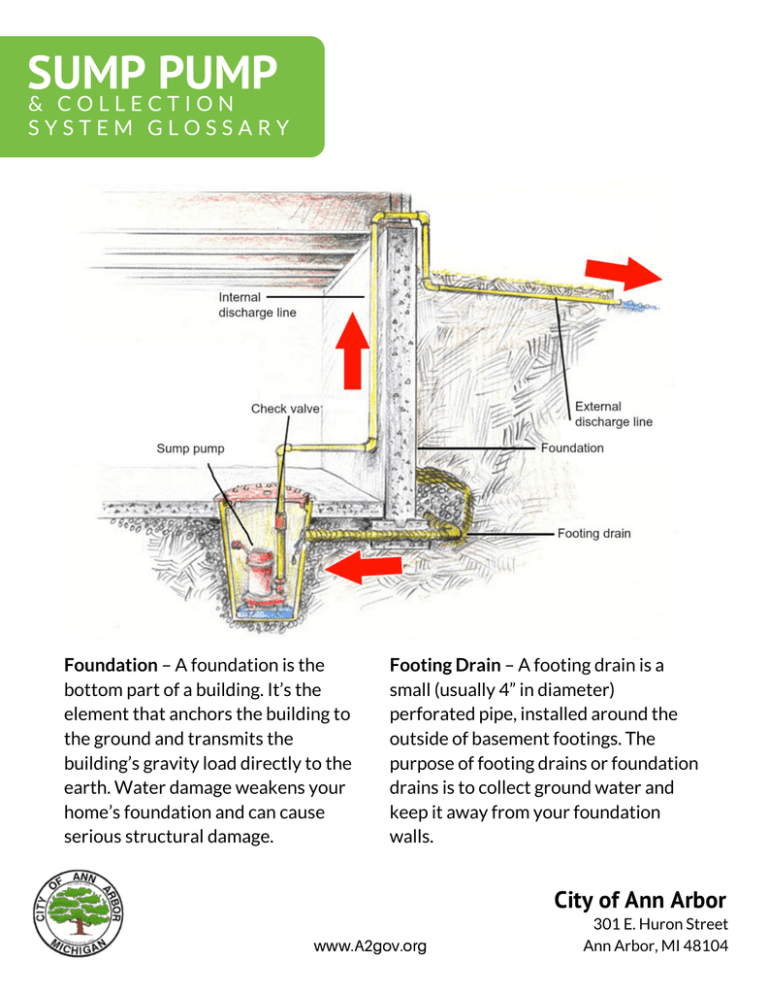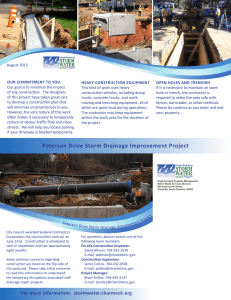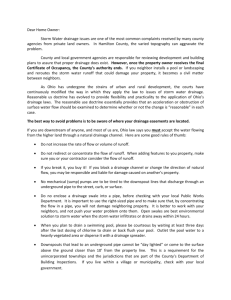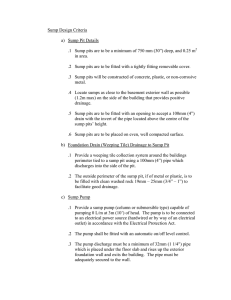SUMP PUMP - The City of Ann Arbor
advertisement

SUMP PUMP & COLLECTION SYSTEM GLOSSARY Foundation – A foundation is the bottom part of a building. It’s the element that anchors the building to the ground and transmits the building’s gravity load directly to the earth. Water damage weakens your home’s foundation and can cause serious structural damage. Footing Drain – A footing drain is a small (usually 4” in diameter) perforated pipe, installed around the outside of basement footings. The purpose of footing drains or foundation drains is to collect ground water and keep it away from your foundation walls. City of Ann Arbor www.A2gov.org 301 E. Huron Street Ann Arbor, MI 48104 SUMP PUMP & COLLECTION SYSTEM GLOSSARY Sump Pump – A sump pump is a mechanical device that sits in a pit in your basement. Sump pumps are part of a foundation drainage system designed to direct ground water away from the house’s foundation. Sump Pump Internal Discharge Line – Your sump pump pumps water out of the sump pit through an internal discharge line that exits your home and connects to an external discharge pipe outside your home. Check valve – A check valve is a type of “one-way” valve that allows water to move in one direction only. The purpose of the check valve is to prevent water that’s being pumped out of the sump pit from flowing back into the sump pit. Sump Pump External Discharge Line – The internal discharge pipe inside your home is connected to a discharge pipe outside your home. The external discharge pipe is connected to a curb drain that sends the water to the City’s storm water collection system, or to a drainage area in your yard. Air gap – An air gap is a space between the outlet of one pipe and the rim of the receptor pipe. The purpose of the air gap is to allow for emergency overflow in the event of an issue in the external discharge, the curb collection system or the stormwater system. Air gap a2gov.org/sumppumps 2 SUMP PUMP & COLLECTION SYSTEM GLOSSARY Cleanout – A cleanout is a capped pipe, which provides access to the exterior discharge line, allowing people to cleanout blockages in the line. Clogs in the line are the responsibility of the property owner, as is keeping the cleanout clear of blockages. It’s a good idea for homeowners to know where each cleanout is located and to keep the surrounding area clear. Cleanout Tap - A tap is a connection from a residential sewer lead to the City’s sanitary or storm sewer systems. Curb drain – a curb drain is part of the storm drainage system designed to collect stormwater from homes or buildings and transport it to an outlet. Storm sewer – A storm sewer is a drainage and collection system designed to collect precipitation and runoff from streets, yards, parking lots and rooftops. The storm water collection system transports storm water and discharges it to rivers, streams and drains. Curb drain Curb drain Storm sewer outlet a2gov.org/sumppumps 3 SUMP PUMP & COLLECTION SYSTEM GLOSSARY Catch basin - A catch basin is a part of a storm drain or sewer system that is designed to trap debris so that it cannot enter the drainage pipes. Right-of-Way – A right-of-way is a right to make a way over a piece of land, usually to and from another piece of land. A type of easement granted or reserved over the land for transportation purposes, this can be for a highway, public footpath, rail transport, canal, as well as for utilities, such as electrical transmission lines, oil and gas pipelines, water mains and sanitary and storm sewers. A rightof-way is reserved for the purposes of maintenance or expansion of existing services. Catch basin Right-of-way Drainage – Drainage is the soil’s ability to allow water to pass through it. Dense soil will hold water, while loose soil will allow water to pass through quickly. Drainage also refers to how and where water flows on a piece of property. One of the most common causes of basement water problems is poor exterior drainage. Drainage a2gov.org/sumppumps 4 SUMP PUMP & COLLECTION SYSTEM GLOSSARY Grading – Grading means creating a level base or specified slope to improve drainage around a building. One of the most common causes of water in basements is poor drainage. This can sometimes be corrected by grading. Grading Pitch – The pitch or slope, rise, grade or incline is the tangent of the angle of that surface to the horizontal. Swale – a swale is a low tract of land, often moist or wet, sometimes built to manage stormwater. Swales can be a natural or man-made feature. Pitch Swale Low spot – A low spot in a yard or a swale, can collect water, causing wet and marshy land. Low spot a2gov.org/sumppumps 5 SUMP PUMP & COLLECTION SYSTEM GLOSSARY Berm - A berm is a naturally occurring or manmade mound of earth. In landscaping, berms are often used to provide privacy, direct stormwater flow and add variation to a landscape. Berm Floor Drain - The floor drain is usually round, and about 4 inches in diameter. The purpose of the floor drain is to capture any water that collects in the basement. For that reason, the floor around the drain is sloped to direct water to the drain. Floor drain Trap - A trap is a bend in a piping system, typically under a floor drain, wash basin or laundry tub, that always holds water, to prevent sewer gases from entering buildings. Backflow preventer - A backflow preventer is a type of “one-way” valve that allows water to move in one direction only. This device is installed onto your plumbing system to protect your drinking water and the city water supply from contaminants. a2gov.org/sumppumps Trap Backflow preventer (RPZ valve) 6



